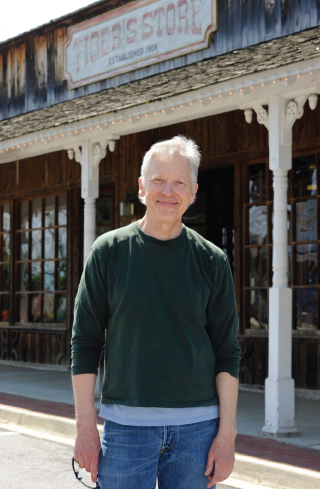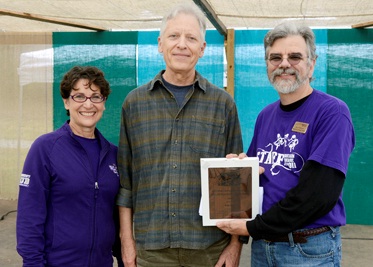mountain heritage award 2012
Western Carolina University’s Mountain Heritage Awards for 2012 were presented Saturday (Sept. 29) to Rob Tiger, a Hayesville community leader who has led numerous efforts to preserve that town’s historic and cultural heritage, and the Jackson County Genealogical Society, whose members have been working for more than two decades to advance genealogical research in Jackson County and across the region.
The awards were presented by Susan Belcher, wife of WCU Chancellor David O. Belcher, as part of activities at the university’s 38th annual Mountain Heritage Day festival.
The university bestows Mountain Heritage Awards each year on one individual and one organization in recognition of their outstanding contributions to the preservation or interpretation of the history and culture of Southern Appalachia, or for outstanding contributions to research on, or interpretation of, Southern Appalachian issues. Award recipients are chosen by a special university committee following guidelines set when the award was established in 1976.
Rob Tiger
Tiger is a founder and organizer of the Clay County Communities Revitalization Association, which includes about 150 citizens who have worked for more than a decade to enhance the quality of life in Clay County while boosting the area’s economy through a series of projects, many of them related to the preservation of traditional Appalachian culture.
A Clay County native and fourth-generation owner of Tiger’s Department Store on Hayesville’s town square, Tiger earned a social sciences degree with a concentration in anthropology at WCU in 1973. He credits his time at WCU with fostering his love of service. Tiger has taken to heart his grandfather often-repeated statement: “You owe a fair amount back to your community.”
In the mid-1990s, Tiger and other Clay County residents gathered to consider ways to offset the county’s economic decline and attract business. The CCCRA quickly developed and achieved nonprofit status by 2000. Since then, the organization has received $500,000 in funding and has tackled a lineup of ambitious projects, including the exterior restoration of the historic Clay County Courthouse. The building is now on the National Register of Historic Places.

Another project being undertaken by the CCCRA, in partnership with the Clay County Historical and Arts Council Museum, is the Cherokee Homestead Exhibit, under construction since 2007. Being developed just a couple of blocks from the
WCU anthropology students, led by anthropology professor Jane Eastman, have been involved in helping build the exhibit since the summer of 2009. CCCRA members envision the outdoor exhibit as an enhancement for local quality of life and as a regional destination for visitors. It already serves as an outdoor classroom for regional schoolchildren and as the setting for a Cherokee heritage festival.
A project that the CCCRA would like to tackle in the future is the restoration of the courthouse’s interior. Plans call for gallery, performance and community space in the historic structure.
Tiger’s leadership of the CCCRA has been recognized by both WCU and Handmade in America. He received the Distinguished Alumni Award from WCU’s College of Arts and Sciences in 2009, and earlier this year Tiger was

